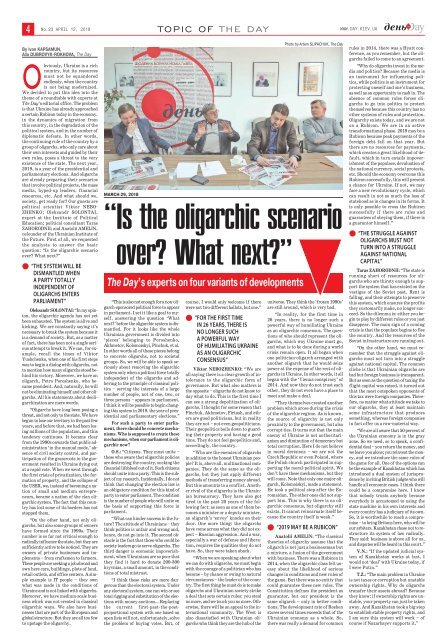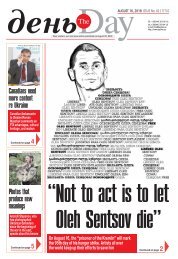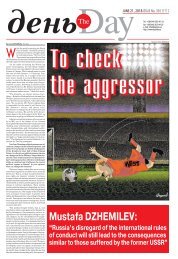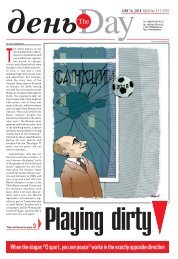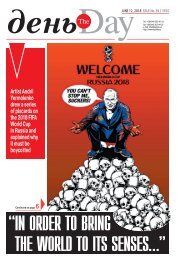#23_1-8
You also want an ePaper? Increase the reach of your titles
YUMPU automatically turns print PDFs into web optimized ePapers that Google loves.
4<br />
No.23 APRIL 12, 2018<br />
TOPIC OF THE DAY<br />
WWW.DAY.KIEV.UA<br />
By Ivan KAPSAMUN,<br />
Alla DUBROVYK-ROKHOVA, The Day<br />
Obviously, Ukraine is a rich<br />
country, but its resources<br />
must not be squandered<br />
endlessly, when the country<br />
is not being modernized.<br />
We decided to put this idea into the<br />
theme of a roundtable with experts at<br />
The Day’s editorial office. The problem<br />
is that Ukraine has already approached<br />
a certain Rubicon today in the economy,<br />
in the dynamics of migration from<br />
this country, in the degradation of the<br />
political system, and in the number of<br />
diplomatic defeats. In other words,<br />
the continuing rule of the country by a<br />
group of oligarchs, who only care about<br />
their own interests and guided by their<br />
own rules, poses a threat to the very<br />
existence of the state. The next year,<br />
2019, is a year of the presidential and<br />
parliamentary elections. And oligarchs<br />
are already preparing their scenarios<br />
that involve political projects, the mass<br />
media, hyped-up leaders, financial<br />
resources, etc. And what should we,<br />
society, get ready for? Our guests are<br />
political scientist Viktor NEBO-<br />
ZHENKO; Oleksandr SOLONTAI,<br />
expert at the Institute of Political<br />
Education; political consultant Taras<br />
ZAHORODNII; and Anatolii AMELIN,<br />
cofounder of the Ukrainian Institute of<br />
the Future. First of all, we requested<br />
the analysts to answer the basic<br />
question: “Is the oligarchic scenario<br />
over? What next?”<br />
● “THE SYSTEM WILL BE<br />
DISMANTLED WHEN<br />
A PARTY TOTALLY<br />
INDEPENDENT OF<br />
OLIGARCHS ENTERS<br />
PARLIAMENT”<br />
Oleksandr SOLONTAI: “In my opinion,<br />
the oligarchic agenda has not yet<br />
been exhausted. The system is alive and<br />
kicking. We are constantly saying it’s<br />
necessary to break the system because it<br />
is a demand of society. But, as a matter<br />
of fact, there has been not a single serious<br />
attempt to break it. We can, for example,<br />
recall the times of Viktor<br />
Yushchenko, when one of his first steps<br />
was to begin a dialog with oligarchs, not<br />
to mention how many oligarchs stood behind<br />
his victory. Moreover, we have an<br />
oligarch, Petro Poroshenko, who became<br />
president. And, naturally, he will<br />
not be eliminating himself and other oligarchs.<br />
All his statements about deoligarchization<br />
are mere words.<br />
“Oligarchs have long been posing a<br />
threat, and not only to the state. We have<br />
begun to lose our territory in the past few<br />
years, and before that, we had been losing<br />
millions of the population, and this<br />
tendency continues. It became clear<br />
from the 1990s onwards that public administration<br />
‘in the manual mode,’ absence<br />
of civil society control, and participation<br />
of the grassroots in the government<br />
resulted in Ukraine dying out<br />
at a rapid rate. When we went through<br />
the first crisis of privatization, the formation<br />
of property, and the collapse of<br />
the USSR, we, instead of becoming a nation<br />
of small and medium entrepreneurs,<br />
became a nation of the clan oligarchic<br />
system. The fact that this country<br />
has lost some of its borders has not<br />
stopped them.<br />
“On the other hand, not only oligarchs,<br />
but also some groups of owners<br />
have formed since the 1990s. Their<br />
number is so far not critical enough to<br />
radically influence the state, but they are<br />
sufficiently active to be noticed. They are<br />
owners of private businesses and implements<br />
– from craftsmen to farmers.<br />
These people are seeking a job abroad and<br />
own here cars, buildings, plots of land,<br />
retail outlets, and office centers. A simple<br />
example is IT people – they own<br />
what was made in the conditions of<br />
Ukraine and is not linked with oligarchs.<br />
Moreover, we have medium-scale business<br />
which was not created in classical<br />
oligarchic ways. We also have businesses<br />
that are part of the European and<br />
global structure. But they are all too few<br />
to upstage the oligarchy.<br />
MARCH 29, 2018<br />
The Day’s experts on four variants of developments<br />
“This is also not enough for a non-oligarch-sponsored<br />
political force to appear<br />
in parliament. I set it like a goal to myself,<br />
answering the question ‘What<br />
next?’ before the oligarchic system is dismantled.<br />
For it looks like the whole<br />
Ukrainian government is divided into<br />
‘pieces’ belonging to Poroshenko,<br />
Akhmetov, Kolomoiskyi, Pinchuk, et al.<br />
In other words all of these pieces belong<br />
to concrete oligarchs, not to societal<br />
groups. So, we will be able to speak seriously<br />
about removing the oligarchic<br />
system only when a political force totally<br />
independent of the oligarchs and adhering<br />
to the principle of classical politics<br />
– serving the interests of a large<br />
number of people, not of one, two, or<br />
three persons – appears in parliament.<br />
I think it will be possible to begin changing<br />
this system in 2019, the year of presidential<br />
and parliamentary elections.”<br />
For such a party to enter parliament,<br />
there should be concrete mechanisms.<br />
Who is supposed to create these<br />
mechanisms, when our parliament is oligarchic<br />
now?<br />
O.S.: “Citizens. They must unite –<br />
those who aware that oligarchic policies<br />
are destroying the country, sucking the<br />
financial lifeblood out of it. Such citizens<br />
should unite into a party. This is the subject<br />
of my research. Incidentally, I do not<br />
think that changing the election law is<br />
an obligatory condition for this kind of<br />
party to enter parliament. The condition<br />
is the number of people who will unite on<br />
the basis of supporting this force in<br />
parliament.<br />
“What can hinder success in the future?<br />
The attitude of Ukrainians – they<br />
think politics is unfair and wrong and,<br />
hence, do not go into it. The second obstacle<br />
is the fact that those who could be<br />
society leaders go to serve oligarchs. The<br />
third danger is economic impoverishment,<br />
when Ukrainians are so poor that<br />
they find it hard to donate 200-300<br />
hryvnias, a small amount, in the conditions<br />
of total mistrust.<br />
“I think these risks are more dangerous<br />
than the electoral system. Under<br />
any electoral system, one can win or see<br />
total rigging and substitution of the elections<br />
with money auctions… Replacing<br />
the current first-past-the-postproportional<br />
system with one based on<br />
open lists will not, unfortunately, solve<br />
the problem of buying votes. But, of<br />
course, I would only welcome if there<br />
were not two different ballots, but one.”<br />
● “FOR THE FIRST TIME<br />
IN 26 YEARS, THERE IS<br />
NO LONGER SUCH<br />
A POWERFUL WAY<br />
OF HUMILIATING UKRAINE<br />
AS AN OLIGARCHIC<br />
CONSENSUS”<br />
Viktor NEBOZHENKO: “We are<br />
all saying there is a clear growth of intolerance<br />
to the oligarchic form of<br />
governance. But what also matters is<br />
the opposite – oligarchs do not know today<br />
what to do. This is the first time I<br />
can see a strong depolitization of oligarchs.<br />
I thought for some reason that<br />
Pinchuk, Akhmetov, Firtash, and others<br />
are good politicians, but in reality<br />
they are not – not even geopoliticians.<br />
Their geopolitics boils down to guarding<br />
their property and having a good<br />
time. They do not feel geopolitics and,<br />
accordingly, the country.<br />
“Who are the enemies of oligarchs<br />
in addition to the honest Ukrainian people?<br />
It is, above all, multinational companies.<br />
They do the same as the oligarchs,<br />
but they just apply different<br />
methods of transferring money abroad.<br />
But this amounts to a conflict. Another<br />
rival of the oligarchs is the Ukrainian<br />
bureaucracy. They have also got<br />
tired in the past 20 years of the following<br />
fact: as soon as one of them becomes<br />
a minister or a deputy minister,<br />
an oligarch’s ‘envoy’ knocks on their<br />
door. One more thing: the oligarchs<br />
have come across what they did not expect<br />
– Russian aggression. And a war,<br />
especially a war of defense and liberation,<br />
requires the qualities they do not<br />
have. So, they were taken aback.<br />
“When we are speaking about what<br />
we can do with oligarchs, we must begin<br />
with the courage of a politician who has<br />
become – by chance or owing to natural<br />
circumstances – the leader of the country.<br />
The first thing he must do is to make<br />
oligarchs and Ukrainian society strike<br />
a deal that sets certain rules: you steal<br />
no more, and we touch you no more. Otherwise,<br />
there will be an appeal to the international<br />
community. The West is<br />
also dissatisfied with Ukrainian oligarchs<br />
who think they are the hub of the<br />
Photo by Artem SLIPACHUK, The Day<br />
“Is the oligarchic scenario<br />
over? What next?”<br />
universe. They think the ‘frozen 1990s’<br />
are still around, which is very bad.<br />
“In reality, for the first time in<br />
26 years, there is no longer such a<br />
powerful way of humiliating Ukraine<br />
as an oligarchic consensus. The questions<br />
of who should represent the oligarchs,<br />
which way Ukraine must go,<br />
and what is to be done during a world<br />
crisis remain open. It all began when<br />
one politician-oligarch arranged with<br />
another oligarch that he would seize<br />
power at the expense of the rest of oligarchs<br />
in Ukraine. In other words, it all<br />
began with the ‘Vienna conspiracy’ of<br />
2014. And now they do not trust each<br />
other, they do not even have a place to<br />
meet and make a deal.<br />
“They themselves created another<br />
problem which arose during the crisis<br />
of the oligarchic regime. As is known,<br />
the source of oligarchy is not only<br />
proximity to the government, but also<br />
corrupt ties. It turns out that the main<br />
enemy of Ukraine is not authoritarianism<br />
and diminution of democracy but<br />
total corruption. Here I do not believe<br />
in moral decisions – we are not the<br />
Czech Republic or even Poland, where<br />
the Polish church participated in supporting<br />
the moral-political spirit. We<br />
don’t have these mechanisms, but they<br />
will come. Note that only one major oligarch,<br />
Kolomoiskyi, made a statement.<br />
He took a political step after the Euromaidan.<br />
The other ones did not support<br />
him. This is why there is no oligarchic<br />
consensus, but oligarchy still<br />
exists. It cannot reincarnate itself because<br />
the country itself is weak.”<br />
● “2019 MAY BE A RUBICON”<br />
Anatolii AMELIN: “The classical<br />
theories of oligarchy assume that the<br />
oligarch is not just a businessman but<br />
a mixture, a fusion of the government<br />
with business. There was a Rubicon in<br />
2014, when the oligarchic class felt uneasy<br />
about the likelihood of serious<br />
changes in conditions and new rules of<br />
the game. But there was no entity that<br />
could guarantee these new rules. The<br />
Constitution defines the president as<br />
guarantor, but our president is the<br />
same oligarch – only in better conditions.<br />
The development rate of Roshen<br />
stores several times exceeds that of the<br />
Ukrainian economy as a whole. So,<br />
there was really a demand for common<br />
rules in 2014, there was a Hyatt conference,<br />
as you remember, but the oligarchs<br />
failed to come to an agreement.<br />
“Why do oligarchs invest in the media<br />
and politics? Because the media is<br />
an instrument for influencing politics,<br />
while politics is an instrument for<br />
protecting oneself and one’s business,<br />
as well as an opportunity to cash in. The<br />
absence of common rules forces oligarchs<br />
to go into politics to protect<br />
themselves because this country has no<br />
other systems of rules and protection.<br />
Oligarchy exists today, and we are not<br />
on a Rubicon. We are in an active<br />
transformational phase. 2019 may be a<br />
Rubicon because peak payments of the<br />
foreign debt fall on that year. But<br />
there are no resources for payments,<br />
which creates a great likelihood of default,<br />
which in turn entails impoverishment<br />
of the populace, devaluation of<br />
the national currency, social protests,<br />
etc. Should the economy overcome this<br />
Rubicon successfully, this will present<br />
a chance for Ukraine. If not, we may<br />
face a new revolutionary cycle, which<br />
can result in not so much the loss of<br />
statehood as in changes in its forms. It<br />
is only possible to cross the Rubicon<br />
successfully if there are rules and<br />
guarantees of obeying them, if there is<br />
a guarantor himself.”<br />
● “THE STRUGGLE AGAINST<br />
OLIGARCHS MUST NOT<br />
TURN INTO A STRUGGLE<br />
AGAINST NATIONAL<br />
CAPITAL”<br />
Taras ZAHORODNII: “The state is<br />
running short of resources for oligarchs<br />
who are thirsty enough to support<br />
the system that has existed on the<br />
vestiges of the Soviet past. Rent is<br />
falling, and their attempts to preserve<br />
this system, which ensures the profits<br />
they customarily make, no longer succeed.<br />
So the dilemma is: either you begin<br />
to play by different rules or you just<br />
disappear. The main sign of a coming<br />
crisis is that the populace begins to flee<br />
the country. And the resources of the<br />
Soviet infrastructure are running out.<br />
“On the other hand, we must remember<br />
that the struggle against oligarchs<br />
must not turn into a struggle<br />
against national capital. The common<br />
cliche is that Ukrainian oligarchs are<br />
bad but foreign business is transparent.<br />
But as soon as the question of taxing the<br />
flight capital was raised, it turned out<br />
that the most outspoken opponents of<br />
this tax were foreign companies. Therefore,<br />
no matter what attitude we take to<br />
our oligarchs, they at least maintain<br />
some infrastructure that produces<br />
something, whereas foreign companies<br />
in fact offer us a raw-material way.<br />
“We are all aware that 50 percent of<br />
the Ukrainian economy is in the gray<br />
zone. So we need, so to speak, a confidential<br />
deal – you return the money, and<br />
we leave you alone; you reinvest the money,<br />
and we introduce the same rules of<br />
the game for all. One of the options can<br />
be the example of Kazakhstan which has<br />
introduced a dual system of jurisprudence<br />
by inviting British judges who will<br />
handle all economic cases. I think there<br />
could be a compromise here. I know<br />
that nobody trusts anybody because<br />
everybody is accustomed to using the<br />
state machine in his own interests and<br />
every country has a judiciary of its own.<br />
So, it is worthwhile to reach a compromise<br />
– to bring Britons here, who will be<br />
our arbiters. Kazakhstan chose not to restructure<br />
its system of law radically.<br />
They said: business is above all for us,<br />
and disputes will be heard in this court.”<br />
V.N.: “If the updated judicial system<br />
of Kazakhstan works at last, I<br />
would not ‘deal’ with Ukraine today, if<br />
I were Putin.”<br />
T.Z.: “The main problem in Ukraine<br />
is not taxes or corruption but unstable<br />
ownership rights. Why do oligarchs<br />
transfer their assets abroad? Because<br />
they know: if ownership rights are unstable,<br />
your property can just be taken<br />
away. And Kazakhstan took a big step<br />
to establish stable property rights, and<br />
I am sure this system will work – of<br />
course if Nazarbayev supports it.”


